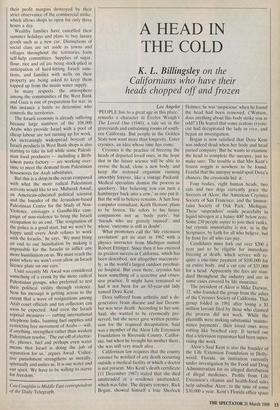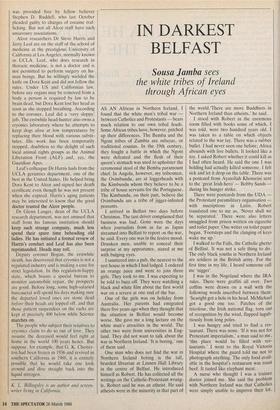A HEAD IN THE COLD
K. L. Billingsley on the
Californians who have their heads chopped off and frozen
Los Angeles 'PEOPLE live to a great age in this place,' remarks a character in Evelyn Waugh's The Loved One (1948), a tale set in the graveyards and embalming rooms of south- ern California. But people in the Golden State now want more than longevity. Enter cryonics, an idea whose time has come.
Cryonics is the practice of freezing the heads of departed loved ones, in the hope that in the future science will be able to revive the head, clone a new body, and keep the restored organism running smoothly forever, like a vintage Packard. Medical specialists dismiss the process as quackery, 'like believing you can turn a hamburger back into a cow,' as one put it. But the will to believe remains. A San Jose computer consultant, Keith Henson, plans to be frozen. He refers to his future companions not as 'body parts', but 'friends who are gravely injured', and whose 'outcome is still in doubt'.
What promoters call the 'life extension revolution' got its start in 1962 with a physics instructor from Michigan named Robert Ettinger. Since then it has enjoyed its greatest success in California, which has been described, not altogether inaccurate- ly, as the world's largest outdoor psychiat- ric hospital. But even there, cryonics has been something of a secretive and obses- sive practice. It might have remained so had it not been for an 83-year-old lady named Dora Kent.
Dora suffered from arthritis and a de- generative brain disease and last Decem- ber was near death. According to her son, Saul, she wanted to be cryonically pre- served, but she never gave written permis- sion for the required decapitation. Saul was a member of the Alcor Life Extension Foundation in Riverside County, Califor- nia, but when he brought his mother there, she was still very much alive.
Californian law requires that the county coroner be notified of any death occurring outside a medical facility at which a doctor is not present. Mrs Kent's death certificate ( I 1 December 1987) stated that she died unattended at a residence unattended, which was false. The deputy coroner, Rick Bogan, showed himself a true Sherlock Holmes; he was 'suspicious' when he found the head had been removed. (Watson, does anything about this body strike you as odd?') He feared that some zealous cryoni- cist had decapitated the lady in vivo, and began an investigation.
Bogan is now satisfied that Dora Kent was indeed dead when her body and head parted company. But he wants to examine the head to complete the autopsy, just to make sure. The trouble is that Mrs Kent's frozen noggin is nowhere to be found. Fearful that the autopsy would spoil Dora's chances, the cryonoids hid it.
Four bodies, eight human heads, two cats and two dogs currently grace the freezers of Alcor, the American Cryonics Society of San Francisco, and the Immor- talist Society of Oak Park, Michigan. These `suspendees' reside peacefully in liquid nitrogen at a balmy 400° below zero. Some 230 people aspire to join their ranks, but cryonic immortality is not, as in the Scriptures, by faith for all who believe, but by frost for all who can pay.
Candidates must fork out over $200 a year just to be eligible for immediate freezing at death, which service will re- quire a one-time payment of $100,000 for an entire body, and a cut rate of $35,000 for a head. Apparently the fees are stan- dard throughout the industry and are in some cases covered by life insurance.
The president of Alcor is Mike Darwin, 32, who founded the group from the ashes of the Cryonics Society of California. That group folded in 1981 after losing a $1 million lawsuit filed by those who claimed the process did not work. While the plaintiffs were making substantial 'mainte- nance payments', their loved ones were rotting like beached carp. It turned out that a television repairman had been super- vising the work.
Alcor's Saul Kent is also the founder of the Life Extension Foundation in Holly- wodd, Florida, an institution currently under investigation by the Food and Drug Administration for its alleged distribution of illegal medicines. Profits from Life Extension's vitamin and health-food sales help subsidise Alcor, to the tune of some $30,000 a year. Kent's Florida office space was provided free by fellow believer Stephen D. Ruddell, who last October pleaded guilty to charges of cocaine traf- ficking. But not all Alcor staff have such unsavoury associations.
Alcor researchers Dr Steve Harris and Jerry Leaf are on the staff of the school of medicine at the prestigious University of California at Los Angeles, normally known as UCLA. Leaf, who does research in thoracic medicine, is not a doctor and is not permitted to perform surgery on hu- man beings. But he willingly wielded the knife on Dora Kent and did not follow the rules. Under US and Californian law, before any organs may be removed from a body a person is required by law to be brain dead, but Dora Kent lost her head as soon as she stopped breathing. According to the coroner, Leaf did a 'very sloppy' job. The erstwhile head-hunter also owns a cryonics laboratory where he attempts to keep dogs alive at low temperatures by replacing their blood with various substi- tutes. His work has been temporarily stopped, doubtless to the delight of such local animal rights groups as the Animal Liberation Front (ALF) and, yes, the Guardian Apes.
Leaf's colleague Dr Harris hails from the UCLA geriatrics department, one of the best in the United States. He helped bring Dora Kent to Alcor and signed her death certificate even though he was not present when she expired. Harris's aging patients may be interested to know that the good doctor trusted the Alcor people.
Dr Glenn Langer, dean of the UCLA research department, was not amused that staff from his famous institution should keep such strange company, much less spend their spare time beheading old ladies. He has initiated a formal review of Harris's conduct and Leaf has also been reprimanded. Heads may roll.
Deputy coroner Bogan, the erstwhile sleuth, has discovered that cryonics is not a regulated industry and is making a case for strict legislation. In this regulation-happy state, which boasts a special bureau to monitor automobile repair, the prospects are good. Before long, some high-salaried bureaucrat will spend his days making sure the departed loved ones are stone dead before their heads are lopped off, and that those patient suspendees on the racks are kept at precisely 400 below while Science marches on.
The people who subject their relatives to cryonics claim to do so out of love. They assume the deceased would feel right at home in the world 100 years hence. But suppose, for example, that G. K. Chester- ton had been frozen in 1936 and revived in southern California in 1988, it is entirely possible that he would take one look around and dive straight hack into the liquid nitrogen.
K. L. Billingsley is an author and screen- writer living in California.



















































 Previous page
Previous page